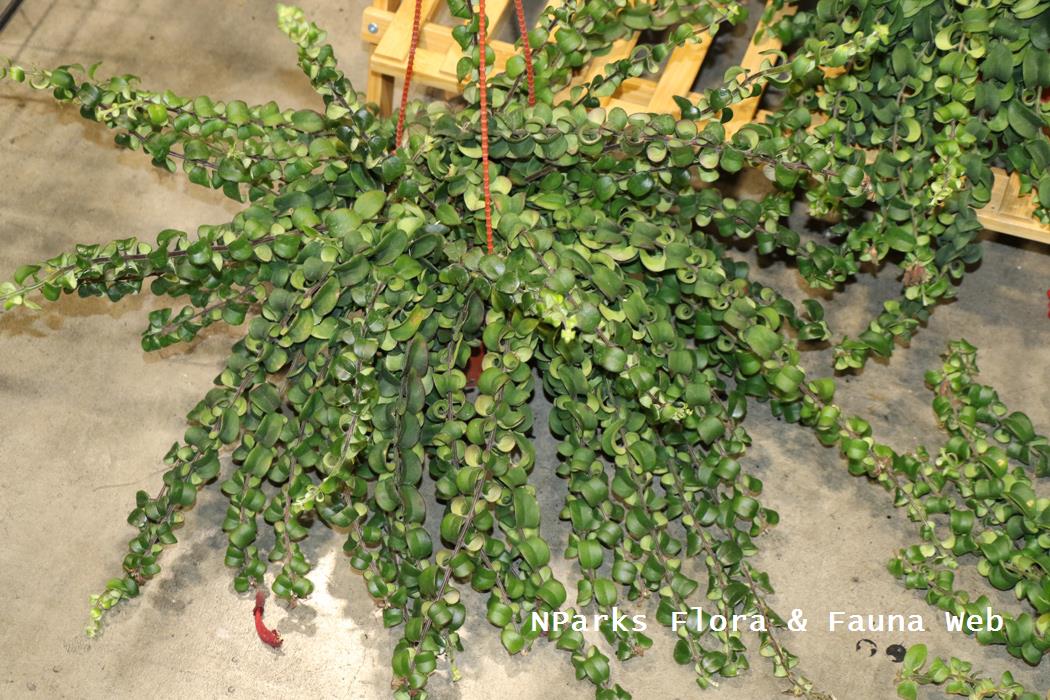
Back
Aeschynanthus speciosus Hook.
| Family Name: | Gesneriaceae |
| Synonyms: | Aeschynanthus aucklandiae, Aeschynanthus splendens, Trichosporum speciosum |
| Common Name: | Lipstick Vine |
Aeschynanthus speciosus has free-flowering clusters of orange and yellow tubular flowers. This evergreen epiphyte has long trailing or hanging branches with glossy green leaves and grows beautifully in hanging baskets.
Name
Classifications and Characteristics
| Plant Division | Angiosperms (Flowering Seed Plants) (Dicotyledon) |
|---|---|
| Plant Growth Form | Epiphyte, Climber |
| Lifespan (in Singapore) | Perennial |
| Mode of Nutrition | Autotrophic |
| Plant Shape | Irregular |
| Maximum Height | 0.5 m to 0.8 m |
| Maximum Plant Spread / Crown Width | 0 m to 0.8 m |
Biogeography
| Native Distribution | Southern Thailand, Peninsular Malaysia, Sumatra, Java, Borneo |
|---|---|
| Native Habitat | Terrestrial |
| Preferred Climate Zone | Tropical |
| Local Conservation Status | Non-native (Horticultural / Cultivated Only) |
Description and Ethnobotany
| Growth Form | Shrub like epiphyte with trailing stems to 80cm long. |
|---|---|
| Foliage | Leaves green, thick leathery. |
| Stems | Green to brown woody stems. |
| Flowers | Flowers are tubular with 5 rounded lobes, calyx bright green. Outer surface of corolla tube yellowish orange at the basal one third (near the calyx), reddish-orange towards the mouth. Inner surface of corolla tube yellowish orange, mouth with a reddish-orange rim and dark reddish brown - maroon markings. |
| Fruit | Long and thin capsules, containing hairy seeds of 1 mm long. |
| Habitat | In its native habitat, it grows as an epiphyte on trees, at an altitude of 150 - 1900 m. |
| Cultivation | Grow in well-draining compost and place under bright, filtered light. Water when the plant is slightly dry & provide a half-strength, balanced liquid fertilizer once a month. Cut the trailing stem after flowering to avoid legginess. Cuttings can be used for propagation. |
| Etymology | The genus epithet Aeschynanthus means shame-flower, with reference to the curved flower tube that looks like bowed head. The specific epithet speciosus means showy, beautiful or good looking. |
Landscaping Features
| Desirable Plant Features | Ornamental Flowers |
|---|---|
| Landscape Uses | Suitable for Hanging Baskets, Interiorscape/ Indoor Plant, Small Gardens, Vertical Greenery / Green Wall, Skyrise / Balcony, Container Planting |
| Thematic Landscaping | Bird & Wildlife Garden |
Fauna, Pollination and Dispersal
| Fauna Pollination Dispersal Associated Fauna | Bird-Attracting (Flowers) |
|---|---|
| Pollination Method(s) | Biotic (Fauna) (Vertebrates (Bird)) |
| Seed or Spore Dispersal | Abiotic |
Plant Care and Propagation
| Light Preference | Semi-Shade |
|---|---|
| Water Preference | Moderate Water, Occasional Misting |
| Plant Growth Rate | Moderate |
| Rootzone Tolerance | Moist Soils, Well-Drained Soils, Fertile Loamy Soils, Easy to Grow |
| Planting Remarks | Prefers slightly cooler growing temperatures; will do well in air conditioned areas if watered sufficiently. |
| Pest(s) | Sucking Insects |
| Propagation Method | Seed, Stem Cutting |
Foliar
| Foliage Retention | Evergreen |
|---|---|
| Mature Foliage Colour(s) | Green |
| Mature Foliage Texture(s) | Smooth |
| Prominent Young Flush Colour(s) | Green |
| Young Flush Texture(s) | Smooth |
| Foliar Type | Simple / Unifoliate |
| Foliar Arrangement Along Stem | Opposite |
| Foliar Attachment to Stem | Petiolate |
| Foliar Shape(s) | Non-Palm Foliage (Elliptical) |
| Foliar Venation | Pinnate / Net |
| Foliar Margin | Entire - Wavy / Undulate |
| Foliar Apex - Tip | Caudate |
| Foliar Base | Acute |
Non - Foliar and Storage
| Stem Type & Modification | Woody |
|---|---|
| Root Type | Underground |
Floral (Angiosperm)
| Flower & Plant Sexuality | Bisexual Flowers |
| Flower Colour(s) | Red, Orange, Yellow / Golden |
|---|---|
| Flower Texture(s) | Velvety / Furry / Tomentose |
| Flower Grouping | Cluster / Inflorescence |
| Flower Location | Terminal |
| Flower Symmetry | Bilateral |
| Individual Flower Shape | Tubular |
| Inflorescence Type | Umbel, Corymb |
| Flowering Period | Free-Flowering, After Rain |
| Flower Lifespan on Plant | 2-3 days |
| Flowering Habit | Polycarpic |
| Flower Size | 6 cm x 2.5 cm |
Fruit, Seed and Spore
| Fruit Type | Dehiscent Dry Fruit , Capsule |
Image Repository
Others
| Master ID | 4 |
|---|---|
| Species ID | 1300 |
| Flora Disclaimer | The information in this website has been compiled from reliable sources, such as reference works on medicinal plants. It is not a substitute for medical advice or treatment and NParks does not purport to provide any medical advice. Readers should always consult his/her physician before using or consuming a plant for medicinal purposes. |








.jpg)

